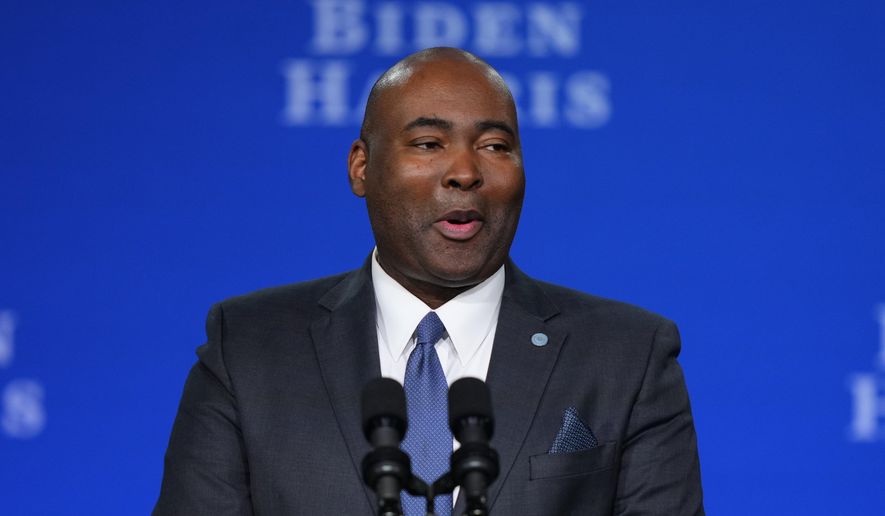PHILADELPHIA — Democrats are poised to reorder their presidential primary schedule beginning next year, replacing Iowa with South Carolina in the leadoff spot as part of a major overhaul meant to empower Black and other minority voters critical to the party’s base of support.
The Democratic National Committee has worked for months to revamp the start of its voting calendar, and the full membership is set to vote on the plan on Saturday.
Although changes are still possible throughout the summer and beyond, the formal endorsement during the party’s meeting in Philadelphia is acknowledgement that the start of 2024’s primary will look very different from the one in 2020.
The proposal has been championed by President Joe Biden and would have South Carolina hold its primary on Feb. 3. That would be followed three days later by New Hampshire and Nevada, the latter of which is swapping the caucus it used to hold in favor of a primary. Georgia would vote fourth on Feb. 13, followed by Michigan on Feb. 27, with much of the rest of the nation set to vote on Super Tuesday in early March.
“This isn’t just about us,” Trav Robertson, chairman of the South Carolina Democratic Party, told a gathering of the DNC Southern caucus earlier this week. “This is a regional thing, and it’s making us all look good.”
States voting early in the primary have major influence since White House hopefuls struggling to raise money or gain political traction often drop out before visiting areas outside the first five. The move marks a major shift from the current calendar, which had started with Iowa’s caucuses for the last five decades, followed by New Hampshire’s primary and subsequent contests in Nevada and South Carolina.
DNC chair Jaime Harrison, a former Senate candidate from South Carolina, said the new schedule “allows the South to stand up, for our voices to be heard.”
Four of the five states that will start Democrats’ new primary schedule are presidential battlegrounds, meaning the eventual party winner can lay groundwork in important general election locales. Michigan and Georgia both voted for Donald Trump in 2016 before flipping to Biden in 2020.
The exception is South Carolina, which hasn’t backed a Democrat in a presidential race since 1976, leading some to argue that the party shouldn’t be concentrating so many early primary resources there. But the state’s population is nearly 27% Black, and African American voters represent Democrats’ most consistent base of support. The change means many will have an earlier impact on the Democratic primary than ever before.
The revamped Democratic calendar could be largely meaningless for 2024 since Biden is expected to seek reelection with no major primary challenge - and the DNC has already pledged to revisit the voting calendar before the 2028 presidential election.
Still, this year’s changes could establish precedent, just as a new lineup that moved Nevada and South Carolina into early voting states did when the DNC approved a new primary lineup before the 2008 presidential election.
Saturday’s vote doesn’t mean the new calendar is locked. South Carolina, Nevada and Michigan have met party requirements to join the party’s new top five. But in Georgia, Republican Secretary of State Brad Raffensperger has said he’d be unwilling to change his state’s Democratic presidential primary without the GOP moving its primary, which hasn’t yet happened.
A DNC rules committee first approved the Biden-endorsed new lineup during its meeting in December, setting up this weekend’s vote. Sixteen states and Puerto Rico made presentations before the rules committee last summer on why they should be allowed to go first - or at least join the new top five.
The proposed changes haven’t come without divisions.
New Hampshire state law mandates that it hold the nation’s first presidential primary, which Iowa had circumvented since 1972 by holding a caucus. New Hampshire Democrats have joined with top state Republicans in vowing to go forward with the nation’s first presidential primary next year regardless of the DNC calendar.
New Democratic rules include penalties for states that attempt to jump ahead of others, including losing delegates to the national convention.
Top New Hampshire Democrats have warned that another Democrat could run in an unsanctioned state primary and, if Biden skips it in accordance with party rules, could win and embarrass the president - prolonging a primary process that wasn’t supposed to be competitive.
That hasn’t deterred Biden, who wrote to the DNC rules committee in December that, “for decades, Black voters in particular have been the backbone of the Democratic Party but have been pushed to the back of the early primary process.”
“We rely on these voters in elections but have not recognized their importance in our nominating calendar,” Biden said. “It is time to stop taking these voters for granted.”




Please read our comment policy before commenting.